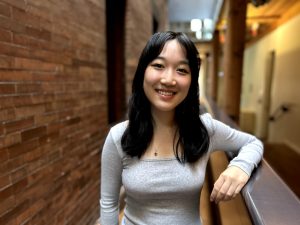
Music and economics both demand precision and creativity. These disciplines also require a deep understanding of patterns and structures. For Olivia Yu, a classically trained violinist and second-year PhD student in the Department of Economics, the similarities go beyond these aspects.
“In my experience, being good at anything requires a lot of routine dedication, discipline, and being very present with the time you spend practicing,” she said.
Adriano Macedo explored what that means to this graduate student in conversation with Olivia.
Department of Economics (DoE): When did you decide to pursue a PhD in economics?
Olivia Yu (OY): I was looking into law programs that also offered the opportunity to do a PhD in economics. Especially in industrial organization, there’s a lot of overlap between intellectual property rights and access to innovation. But at some point, I realized that the way I solve problems is much better suited for academic research than practicing law. At McGill, I had the opportunity to work as an undergraduate research assistant for Professor Laura Lasio, who was working on projects at the intersection of industrial organization and healthcare. We studied the role that stigma plays around certain cancer types, like lung cancer, in terms of how it affects patients’ access to radical innovative therapies. I got really interested in this work, and my brain just clicked with it. I realized I wanted to do this kind of work and focus on it entirely, which led me to pursue a PhD in economics to get the necessary background training.
DoE: What is your current research agenda?
OY: My current research agenda remains in the same field, focusing on how the healthcare system’s design can favor certain patient outcomes and how these inequities in access to healthcare arise. I am working on several projects that explore the institutional determinants of healthcare inequity. For example, my second-year paper studies pediatric transitions to care in Ontario. Pediatric patients with chronic conditions typically see a pediatrician, but when they turn 18, they must transition to the adult healthcare system. This transition is not seamless for everyone. I am investigating how institutional features affect patients’ possibilities for receiving high-quality care. I am also collaborating with Professor Alex Hoagland at the Dalla Lana School of Public Health on projects that examine how biases and inefficiencies in the healthcare system impact patient outcomes.
DoE: Do you find any similarities between teaching music composition and solving economic problems?
OY: Yes, especially in the foundational aspects of pattern recognition and underlying structures in both music and economics. In music, the structure and patterns are just the foundation, the bare bones of what music is. The broader experience of music involves emotional engagement and communication between the performer, composer, and listener. Similarly, in economics, while technical skills and understanding the machinery of economic models are essential, a bigger part of what makes research exciting is the exchange of ideas and novel hypotheses about how the world works in a broader sense. The technical aspects form the foundation, but the broader engagement with research and communication of ideas is where the real excitement lies.
DoE: How does your background in music influence your approach to studying economics?
OY: For context, I’m a classically trained violinist with the Royal Conservatory of Music and I play a bit of piano, which means that I have developed a disciplined, routine-based approach to learning. In my undergraduate studies, I found myself needing a different creative outlet to manage my stress, so I developed my drawing and painting skills in the same way. It turns out that the same routine patience and dedication also helps to learn economics at the PhD level. My classical training in music and self-teaching in art provided me with a robust framework for tackling the demands of the PhD program.
DoE: Can I say that your creative skills are a way to manage your state of mind?
OY: That is a great way to put it. For a couple of months, I felt very burnt out, which led to feelings of anxiety. I realized that my life was out of balance because I had isolated myself too much in the economics world. I found that everything that I was doing that was PhD related crowded out my creative pursuits, leaving my violin and art supplies untouched. To recover, I sought mental health support and began carving out time again for playing piano or violin in the mornings or taking an hour or two of a break in the afternoon to draw again. This helped me reground and regain a sense of balance. So yes, I believe my state of mind is balanced now, as I have integrated creative activities into my routine. I am back to a happy routine.
DoE: What do you suggest to other PhD students for achieving a work-life balance?
OY: One thing I learned through my experience with burn out is that it’s easy to get swallowed up by the PhD program. At the end of the day, even though you are starting a new chapter of your life as a PhD student, who you were before doesn’t go away. And I would wager that you probably don’t want it to! So, I think knowing who you are before beginning a PhD is important. As much as you can, hold on to the things that you believe make you who you are. Make space for that.
Return to the Department of Economics website.
Scroll more news.
